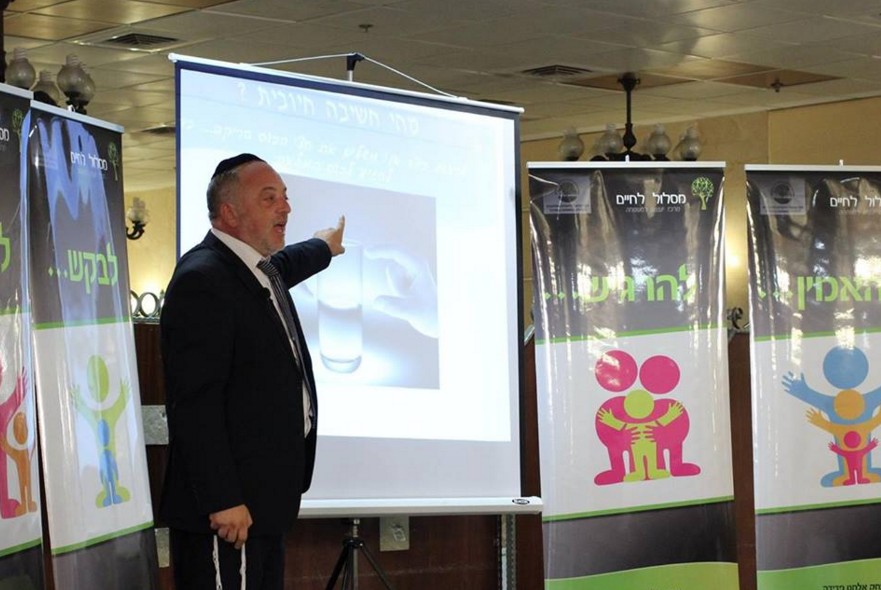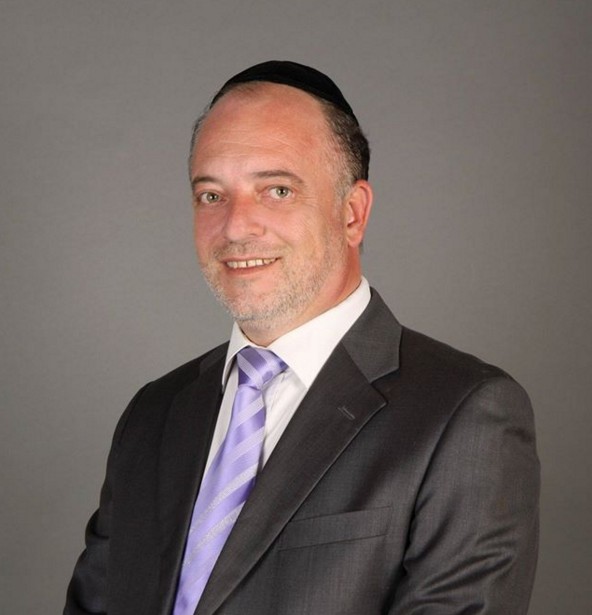Yitzhak Padida: "When I Got Mixed Up with the Gray Market, Reality Hit Me"
Yitzhak Padida was a successful businessman until heart attacks led to the collapse of his businesses and severe entanglement with gray market thugs. From this low point, he rose, shifted directions, and learned how to manage finances. Today, he helps others adopt proper family financial management and get rid of their debts.

When a well-known criminal knocked on Yitzhak Padida's door and announced that he would stay at Padida's house until he got his money back, Padida finally realized that he needed to make a serious change in his life. For weeks, he knew he was deeply entangled with the gray market: threatening letters arrived at his home daily, and at one point, smoke grenades were thrown at his house. But something about having a notorious criminal from the underworld sit on his couch and refuse to get up made the reality hit home.
Until that moment, Padida truly thought that his entanglement with the gray market was unavoidable: his family faced financial difficulties due to an unexpected heart attack he suffered, and loans seemed like the only way for the family to survive.
"I was 36 when I had my first heart attack," Padida recalls, "Until then, I was a successful businessman managing several private businesses." But one day, mid-flight to Los Angeles, he suffered a heart attack. A doctor on board treated him and advised him to fly back to Israel immediately and get hospitalized. Padida followed the advice, but by the time he reached the hospital, he had experienced a second attack and was taken by ambulance. His condition was so severe that during catheterization, he suffered a third heart attack, and doctors concluded that bypass surgery was unavoidable.
Following the operation, Padida had to go through a lengthy eight-month recovery period in which he couldn't work at all. As a result, his businesses collapsed, and the family found themselves with nothing. They had no savings: "I didn't even have a bank account; all the money was immediately drained for expenses because I knew more cash was coming," Padida describes his behavior during those days. "Initially, we sold valuables like jewelry, but eventually, even that was gone." They tried asking for help from extended family, who willingly assisted but whose financial aid wasn't sufficient to cover the family's accustomed expenses. Thus, Padida moved to the next stage: loans. "I decided it made the most sense to juggle between the charity fund and the bank, from the bank to the charity fund, cashing checks at places that take a massive cut, and falling for dubious lenders advertising small notes, even in the religious press, offering loans with interest rates that only in hindsight seemed insane."
 Yitzhak Padida in a lecture
Yitzhak Padida in a lectureFor three years, the Padida family lived like this until, as mentioned, they got entangled with gray market thugs. Padida decided enough was enough - he was no longer willing to live so irrationally. During that period, he began working as an events hall manager, but he knew that even those earnings wouldn't suffice for the standard of living the family was used to. Thus, he took two steps: enrolled in a family economy school and underwent personal coaching to change behavior patterns and improve his time and resource management skills.
"Don't Fall Into the Pit I Was In"
After learning and internalizing the rules of proper economic management, Padida called a family meeting, including his married children. "I explained what everyone already understood - the household was poorly managed financially, and we were about to make significant changes to avoid getting into severe entanglements again." The family began living under a well-organized budget, and even the children had a fixed allowance they were required to manage responsibly. "We didn't start saying 'no' to everything," he emphasizes. "But we did teach the children that they wouldn't get everything they wanted immediately." He also started taking his children shopping, where they were asked to calculate product prices and try to find the best deals.
It took the family three years to return to fiscal balance. When they finally reached that goal, Padida decided to apply his new skills to help people stuck in the same quagmire he had just escaped. He studied coaching and earned a master's degree in business administration, founding the 'Path to Life' – a center for proper economic management consulting. To this day, he says, he has helped hundreds of families who came to him feeling completely helpless and out of control of their income and expenses.
How Do You Help People Deep in Debt?
"The first step is reducing debts by reaching settlements with creditors, including banks, with whom I negotiate directly. The second step is guiding the family in correct economics so they can pay off accumulated debts and return to a balanced budget."
In today's Israel, says Padida, families from all sectors and income deciles fall into debt and struggle to make ends meet. "Among my clients, the average debt is thirty to forty thousand shekels. Often, they arrive after a family event that triggered unusual expenses – like the first bar mitzvah, for instance." At this stage, he says, couples are usually very desperate, and marital harmony isn't great either. Sometimes there is even a disagreement about the need for a change in behavior, but Padida attests that he has always managed to convince the reluctant spouse to cooperate with the plan.
Many People Are Afraid to Cut Expenses Due to Children's Demands...
"That's a big mistake. In general, the perception that you shouldn't talk to children about money is incorrect. Kids need to receive economic education as part of their upbringing. Otherwise, how will they know how to manage when they grow up? I often sit with the children of the families seeking help, build a budget with them, calculate how much things cost, and explain that they need to manage their allowance wisely."

What About Families Claiming They Have Nothing to Save?
"There is almost no such thing. Almost every family has a 'weak link' – a place where they heavily resist saving. It can be the car, insisting on daily meat lunches, or designer clothing 'because cheap is expensive.' I sit down with people and help them find that spot where saving is indeed possible. Additionally, I also advise on how to increase income."
Besides his work as a family economy coach, Padida is also a senior coach using NLP techniques, and he says personal coaching is often needed to bring families to a stable economic state. "Over time, I've discovered that behind the financial problems of the family, there are often completely different issues. Poor management learned from parents, an uncontrollable desire to imitate others, and more. People are stuck and need motivation. It's especially noticeable among the self-employed, who earn based on their output." In coaching, he says, they undergo a process that works on their subconscious and improves their ability to achieve goals and function productively.
Looking Back, How Do You View the Process Since Your Illness?
"I wouldn't skip any station along my path," Padida says firmly. "Before the heart attacks and the economic collapse, I took the good life for granted and forgot to thank Hashem for everything. Today, I know very well how to appreciate what I have – and I also get the privilege to help others so they don't fall into the pit I was in."

